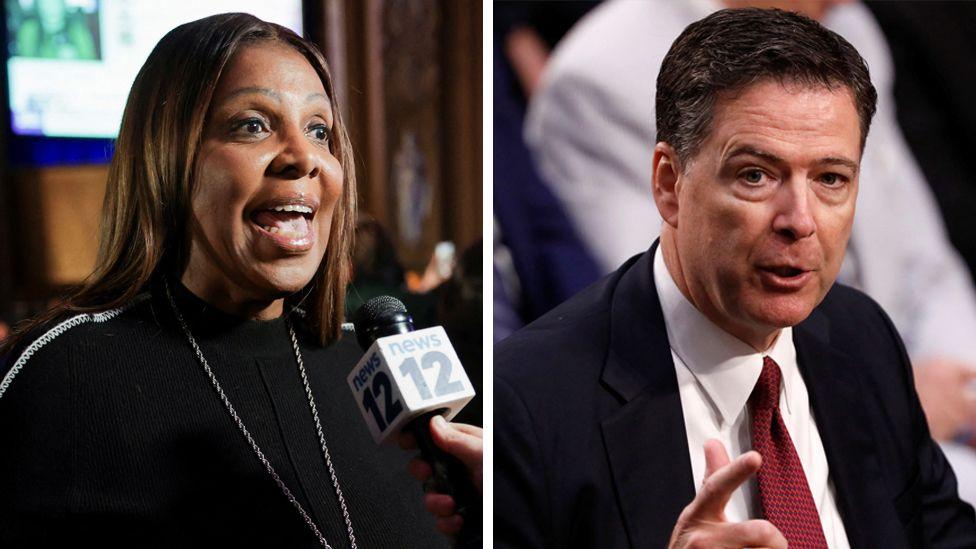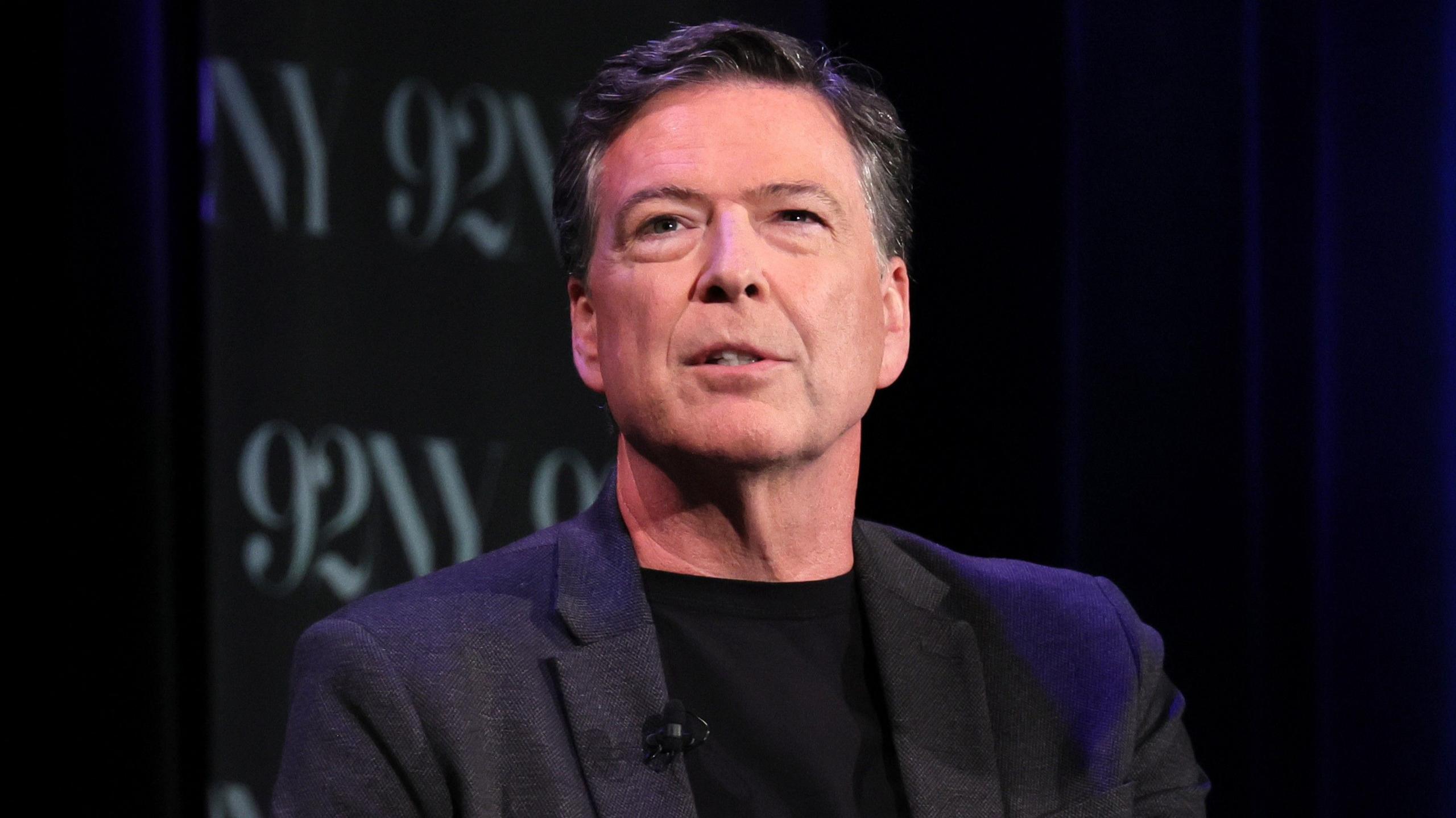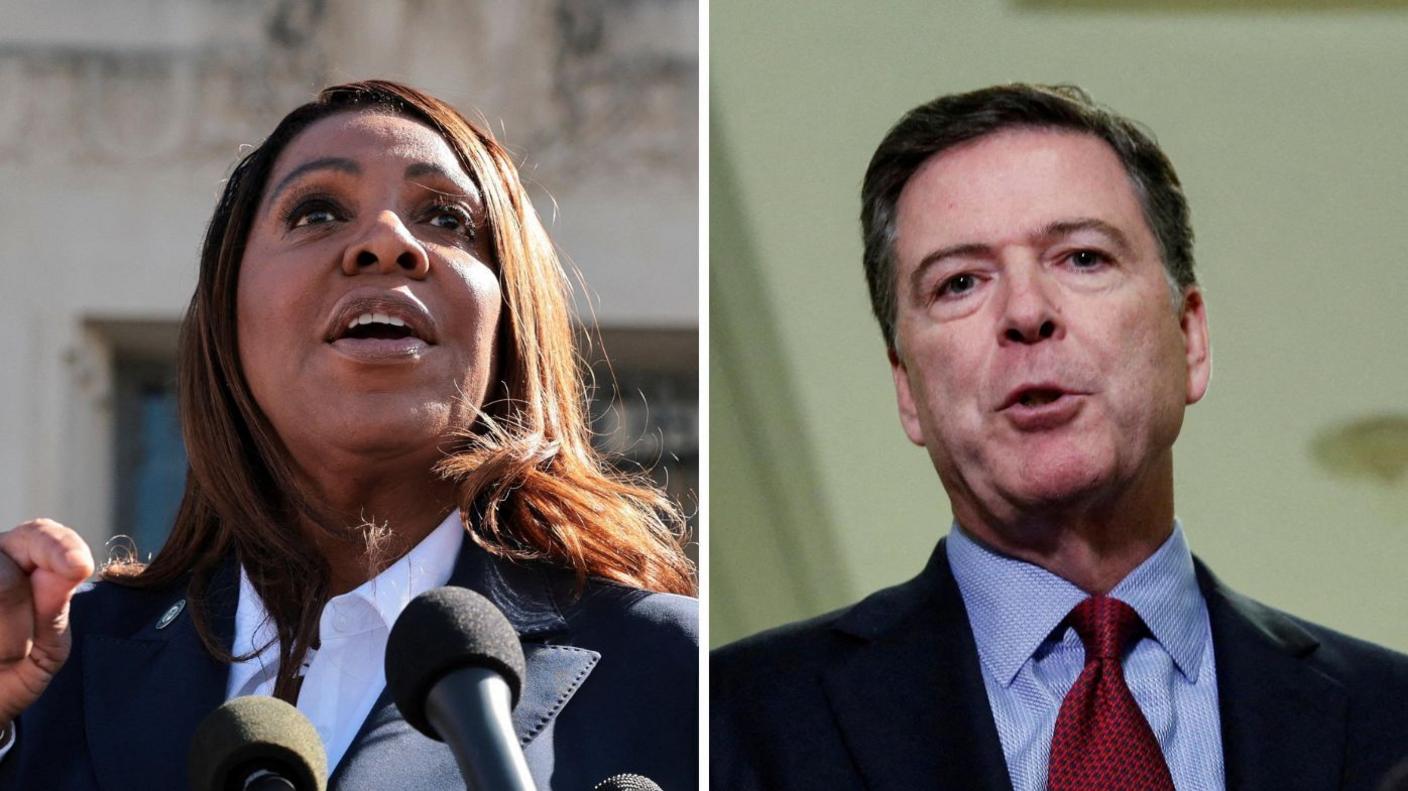What comes next in the James Comey and Letitia James cases?

- Published
Two of President Trump's most prominent critics secured legal victories on Monday when a federal judge threw out the government's charges against them.
For weeks since their indictments, former FBI Director James Comey and New York Attorney General Letitia James have argued furiously that they are innocent, claiming the president and justice department are merely singling them out for retaliation.
US District Judge Cameron Currie tossed the indictments against them because prosecutor Lindsey Halligan's "invalid" appointment as US attorney. But she also left the door open for the government to try again.
Comey acknowledged that possibility after the ruling, saying he believes Trump "will probably come after me again."
And White House spokeswoman Abigail Jackson seemed to confirm it: "This will not be the final word on this matter."
But the government faces steep obstacles to successfully prosecute either after this setback, and experts hesitate to predict what could happen next due to the cases' unprecedented nature.
"It feels to me like uncharted territory," said Kay Levine, Emory University School of Law professor.
Could the justice department appeal?
The Department of Justice can challenge Judge Currie's ruling before a higher appeals court. In this instance, that would be the Fourth Circuit Court of Appeals.
US Attorney General Pam Bondi indicated she would take this route, pledging to use all available legal action, including an "immediate appeal".
In other cases, the Trump administration has aggressively appealed unfavourable rulings, taking cases from lower courts and sometimes fast-tracking its requests up to the US Supreme Court.
Abbe Lowell, an attorney representing James, vowed to "continue to challenge any further politically motivated charges through every lawful means available".
In the event of an appeal, the justice department likely would have its own lawyers argue the case, making Halligan's role in the appeal unclear.
Could there be new charges?
The government charged Comey with making false statements to Congress and obstruction of justice. Federal prosecutors charged James with bank fraud and making false statements to a financial institution.
Both pleaded not guilty. In addition to arguing Halligan was unlawfully appointed, both also claimed to be victims of vindictive prosecution.
With the original indictments thrown out (though, of course, appeals could change that) the government might try to convene new grand juries and secure new indictments.
"As far as everything I've seen, a different attorney could bring James' case to a new grand jury and get a new indictment," said Ms Levine.
But John Day, president of the American College of Trial Lawyers, said it could be a complicated path - certainly in Comey's case.
"I can tell you it will be hotly contested, whether Mr Comey's case can be re-indicted if a lawfully appointed prosecutor is assigned and is able to secure an indictment."
He described the tangle of lawyers, judges, and motions involved as a "procedural morass" with no simple answers.
It might be harder for the government to try to bring the exact same charges against Comey.
One problem is the statute of limitations – the deadline that prosecutors had to charge Comey for these specific allegations – which ended at the end of September. However, the indictment's dismissal would trigger a six-month grace period for the justice department to bring the case again.
Still in that case, his legal team said it plans to argue the government is out of time.
"The decision further indicates that because the indictment is void, the statute of limitations has run and there can be no further indictment," attorney Patrick Fitzgerald said Monday.
What happens to Lindsey Halligan?
In the pair of rulings on the indictments against James and Comey, Judge Currie was blunt: Halligan was wrongly appointed.
Judge Currie wrote in the James ruling that "the Attorney General's attempt to install Ms. Halligan as Interim US Attorney for the Eastern District of Virginia was invalid."
Therefore, Halligan "had no lawful authority to present the indictment", she wrote.
US attorneys are nominated by the president and require US Senate confirmation. Federal statutes govern how people can be appointed on a temporary basis, but Judge Currie found that Halligan's appointment had violated these laws.
That leaves Halligan's role on future cases against James and Comey, again, unclear.
The ruling also could cast a shadow on any other cases Halligan has brought in the Eastern District of Virginia where she serves.
But Bondi said on Monday that she made Halligan "a special US attorney" and praised her work as "excellent."
The White House maintained its position that Halligan was lawfully appointed, press secretary Karoline Leavitt told reporters on Monday.
Related topics
- Published26 September

